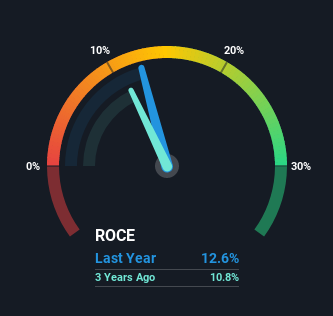- South Africa
- /
- Industrials
- /
- JSE:KAP
Here's What To Make Of KAP Industrial Holdings' (JSE:KAP) Decelerating Rates Of Return

What trends should we look for it we want to identify stocks that can multiply in value over the long term? In a perfect world, we'd like to see a company investing more capital into its business and ideally the returns earned from that capital are also increasing. Ultimately, this demonstrates that it's a business that is reinvesting profits at increasing rates of return. In light of that, when we looked at KAP Industrial Holdings (JSE:KAP) and its ROCE trend, we weren't exactly thrilled.
Understanding Return On Capital Employed (ROCE)
If you haven't worked with ROCE before, it measures the 'return' (pre-tax profit) a company generates from capital employed in its business. Analysts use this formula to calculate it for KAP Industrial Holdings:
Return on Capital Employed = Earnings Before Interest and Tax (EBIT) ÷ (Total Assets - Current Liabilities)
0.13 = R2.5b ÷ (R27b - R7.7b) (Based on the trailing twelve months to December 2021).
Thus, KAP Industrial Holdings has an ROCE of 13%. That's a pretty standard return and it's in line with the industry average of 13%.
See our latest analysis for KAP Industrial Holdings

In the above chart we have measured KAP Industrial Holdings' prior ROCE against its prior performance, but the future is arguably more important. If you'd like, you can check out the forecasts from the analysts covering KAP Industrial Holdings here for free.
What Can We Tell From KAP Industrial Holdings' ROCE Trend?
There hasn't been much to report for KAP Industrial Holdings' returns and its level of capital employed because both metrics have been steady for the past five years. Businesses with these traits tend to be mature and steady operations because they're past the growth phase. So don't be surprised if KAP Industrial Holdings doesn't end up being a multi-bagger in a few years time. This probably explains why KAP Industrial Holdings is paying out 40% of its income to shareholders in the form of dividends. Unless businesses have highly compelling growth opportunities, they'll typically return some money to shareholders.
On another note, while the change in ROCE trend might not scream for attention, it's interesting that the current liabilities have actually gone up over the last five years. This is intriguing because if current liabilities hadn't increased to 28% of total assets, this reported ROCE would probably be less than13% because total capital employed would be higher.The 13% ROCE could be even lower if current liabilities weren't 28% of total assets, because the the formula would show a larger base of total capital employed. So while current liabilities isn't high right now, keep an eye out in case it increases further, because this can introduce some elements of risk.
The Bottom Line
We can conclude that in regards to KAP Industrial Holdings' returns on capital employed and the trends, there isn't much change to report on. And in the last five years, the stock has given away 42% so the market doesn't look too hopeful on these trends strengthening any time soon. On the whole, we aren't too inspired by the underlying trends and we think there may be better chances of finding a multi-bagger elsewhere.
KAP Industrial Holdings does come with some risks though, we found 3 warning signs in our investment analysis, and 1 of those is concerning...
For those who like to invest in solid companies, check out this free list of companies with solid balance sheets and high returns on equity.
If you're looking to trade KAP, open an account with the lowest-cost platform trusted by professionals, Interactive Brokers.
With clients in over 200 countries and territories, and access to 160 markets, IBKR lets you trade stocks, options, futures, forex, bonds and funds from a single integrated account.
Enjoy no hidden fees, no account minimums, and FX conversion rates as low as 0.03%, far better than what most brokers offer.
Sponsored ContentValuation is complex, but we're here to simplify it.
Discover if KAP might be undervalued or overvalued with our detailed analysis, featuring fair value estimates, potential risks, dividends, insider trades, and its financial condition.
Access Free AnalysisHave feedback on this article? Concerned about the content? Get in touch with us directly. Alternatively, email editorial-team (at) simplywallst.com.
This article by Simply Wall St is general in nature. We provide commentary based on historical data and analyst forecasts only using an unbiased methodology and our articles are not intended to be financial advice. It does not constitute a recommendation to buy or sell any stock, and does not take account of your objectives, or your financial situation. We aim to bring you long-term focused analysis driven by fundamental data. Note that our analysis may not factor in the latest price-sensitive company announcements or qualitative material. Simply Wall St has no position in any stocks mentioned.
About JSE:KAP
KAP
Engages in industrial, chemical, and logistics businesses in South Africa, rest of Africa, the Americas, Europe, the Middle East, and Australasia.
Very undervalued with reasonable growth potential.
Similar Companies
Market Insights
Community Narratives



